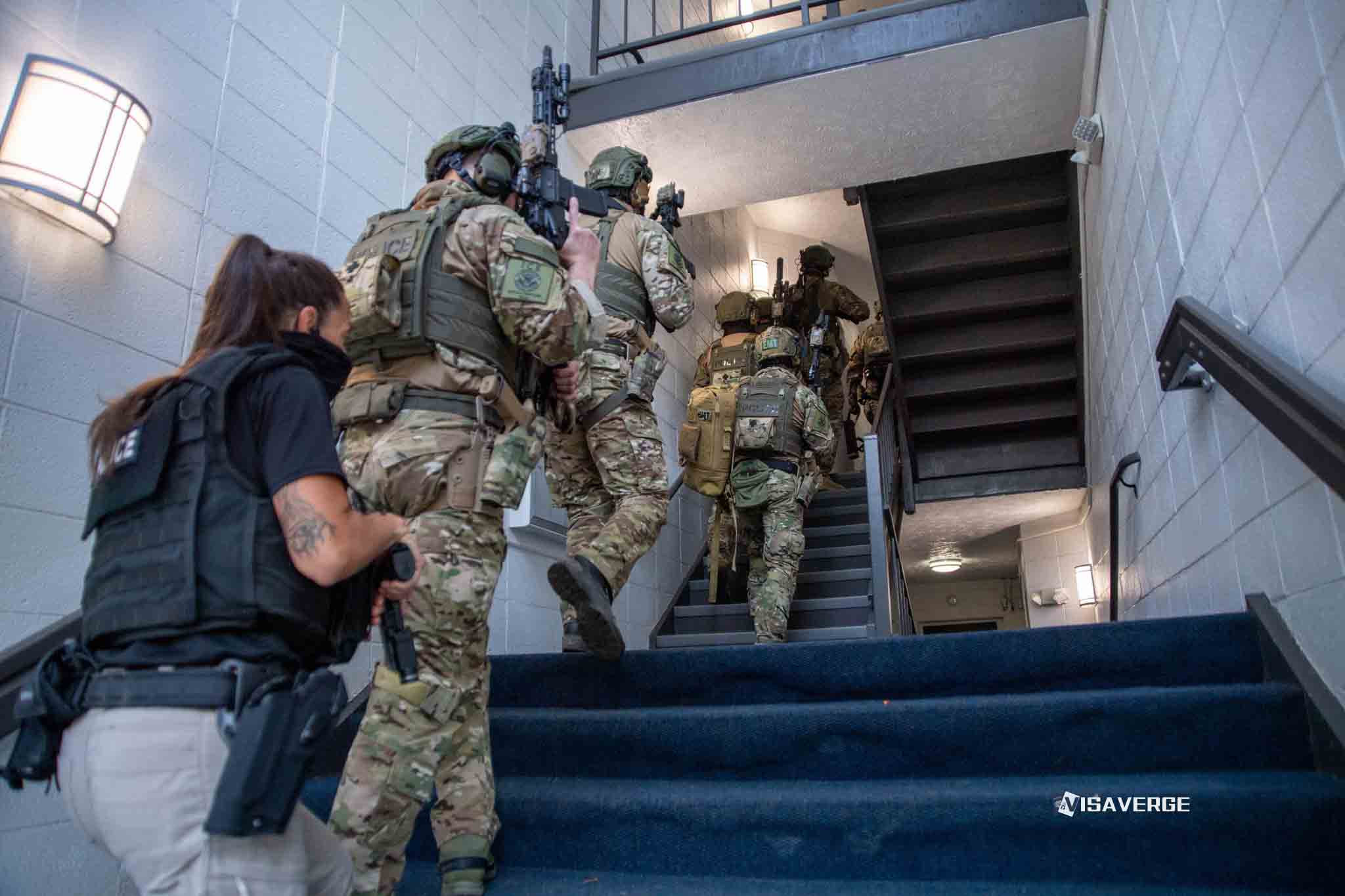Key Takeaways
• Thousands protested on June 10, 2025, against Trump’s mass deportation policies nationwide.
• Trump deployed 2,000 National Guard troops to Los Angeles without state consent.
• ACLU filed suit on June 10 to block fast-track deportations violating due process.
A Wave of Protests Sweeps the United States 🇺🇸 Over Trump’s Mass Deportation Policies
On June 10, 2025, thousands of people took to the streets in cities across the United States 🇺🇸, including New York City, Chicago, Seattle, San Francisco, Dallas, Austin, Philadelphia, and Los Angeles. The protests erupted in response to President Trump’s mass deportation policies and the recent deployment of U.S. military forces to California to support immigration enforcement. The situation in Los Angeles became especially tense after President Trump ordered 2,000 California National Guard troops into the city, a move that California Governor Gavin Newsom strongly condemned, pointing out that the state had not asked for federal help.

This latest round of protests is part of a growing national backlash against the Trump administration’s aggressive immigration enforcement measures. These policies have led to widespread fear and anxiety among immigrant communities, legal challenges from civil rights groups, and a renewed debate about the role of federal power in immigration matters.
What’s Happening: The Lead Story
Who: Protesters, immigrants, federal and state officials, and law enforcement
What: Large-scale protests and legal action against President Trump’s mass deportation policies
When: June 10, 2025, with ongoing developments
Where: Major U.S. cities, with a focus on Los Angeles
Why: Opposition to fast-track deportations, military involvement in immigration enforcement, and concerns about due process
How: Demonstrations, legal challenges, and public statements from key stakeholders
The Escalation in Los Angeles
The deployment of 2,000 National Guard troops to Los Angeles marked a turning point in the federal government’s approach to immigration enforcement. President Trump’s decision to send military forces into the city was met with immediate criticism from California Governor Gavin Newsom, who stated that the state did not request or support the intervention. Many residents and local officials viewed the move as an overreach of federal authority and a direct challenge to California’s stance on immigration.
During the protests in Los Angeles, tensions ran high. While many demonstrations remained peaceful, some escalated into clashes with law enforcement. Police used chemical irritants to disperse crowds, and several protesters were arrested. The heavy presence of military and law enforcement personnel added to the sense of fear and uncertainty among immigrants and their supporters.
Nationwide Protests and Clashes
The protests were not limited to Los Angeles. In New York City, thousands gathered to voice their opposition to the Trump administration’s policies. Similar scenes played out in Chicago, Seattle, Philadelphia, and other cities. In Philadelphia, police made multiple arrests after demonstrators blocked roads. In New York City, at least half a dozen protesters were taken into custody.
Despite the risks, many people felt compelled to join the protests. Some said they were marching on behalf of friends and family members who were too afraid to appear in public due to the threat of detention or deportation. Others described a sense of duty to stand up for vulnerable members of their communities.
The Trump Administration’s Mass Deportation Policies
Since President Trump began his second term on January 20, 2025, his administration has made mass deportations a central focus. The Department of Homeland Security (DHS) issued a memo on January 23, 2025, granting broad immigration enforcement powers to several federal agencies. This included not only Immigration and Customs Enforcement (ICE), but also the Drug Enforcement Administration (DEA), the Bureau of Alcohol, Tobacco, Firearms and Explosives (ATF), the U.S. Marshals Service, and the Federal Bureau of Investigation (FBI).
This expansion of authority has led to a dramatic increase in immigration enforcement operations. ICE and other agencies have carried out raids in parking lots, neighborhoods, and workplaces across the country and in Puerto Rico. The administration has publicly set a goal of arresting 3,000 migrants per day.
Fast-Track Deportation: How It Works
One of the most controversial aspects of the Trump administration’s approach is the use of fast-track deportation, also known as expedited removal. Under this policy, individuals can be detained and deported quickly, often without a formal hearing or access to legal counsel. Here’s how the process typically unfolds:
- ICE identifies individuals at immigration court appointments or through raids.
- Individuals are detained on-site, often without prior notice.
- Detainees are processed for expedited removal, frequently without a formal hearing or access to legal counsel.
- Deportation is executed rapidly, sometimes within days, unless legal intervention occurs.
Immigrants’ rights groups argue that this process strips away basic legal protections and violates the principle of due process, which is the right to fair treatment under the law.
Legal Challenges and Civil Rights Concerns
On June 10, 2025, the American Civil Liberties Union (ACLU) and allied organizations filed a motion in federal court to block the Trump administration’s fast-track deportation policy. They argue that the policy is “unprecedented and lawless” and violates due process rights guaranteed by the U.S. Constitution. Legal experts warn that these policies could face significant challenges in court, especially if they are found to deny individuals the right to a fair hearing.
In some locations, legal advocates and observers have been barred from attending immigration court hearings, further limiting transparency and support for detainees. This has raised additional concerns about the fairness and legality of the process.
The Human Impact: Fear, Trauma, and Family Separation
The aggressive enforcement of mass deportation policies has had a profound effect on immigrant communities. Many families are living in fear, avoiding public spaces and even skipping legal appointments out of concern that they could be detained. This climate of fear has led to increased anxiety, trauma, and disruption of daily life.
One of the most painful consequences has been the renewed separation of families. Children have been left without parents, and spouses have been torn apart. These stories echo the controversies of President Trump’s first term, when family separation became a major national issue.
Community leaders and activists argue that the policies are designed to instill fear and suppress immigrant participation in civic life. They warn that the long-term effects could include a breakdown of trust between immigrant communities and law enforcement, making it harder to maintain public safety.
Federal and State Officials: Conflicting Views
President Trump has defended his administration’s actions, arguing that strict enforcement is necessary for national security and law enforcement. DHS Secretary Kristi Noem stated on social media that “ICE will continue to enforce the law” despite protests and public outcry.
However, state officials like California Governor Gavin Newsom have pushed back, objecting to federal intervention and the deployment of military forces without state consent. Newsom’s public condemnation of the National Guard deployment in Los Angeles highlights the ongoing tension between federal and state governments over immigration policy.
Quantitative Data: The Scale of Enforcement and Protest
- ICE Raids: On January 23, 2025, coordinated ICE raids in cities including Atlanta, Boston, Denver, Miami, New York City, Newark, Philadelphia, Seattle, and Washington, D.C., resulted in the detention of 538 individuals. The administration claims these included a suspected terrorist, gang members, and individuals convicted of sex crimes against minors.
- Protest Participation: Thousands participated in New York City protests on June 10, with hundreds to thousands more in cities like Los Angeles, Chicago, Seattle, and Philadelphia.
- Arrests at Protests: In New York City, at least half a dozen protesters were arrested. In Philadelphia, police made multiple arrests after demonstrators blocked roads. In Los Angeles, police used chemical irritants to disperse crowds.
Guantanamo Bay Preparations
In a move that shocked many observers, President Trump ordered preparations for the Guantanamo Bay detention camp to house tens of thousands of migrants. This decision, made on January 29, 2025, signals a willingness to use military detention for immigration enforcement. Military legal experts note that while the president has the authority to deploy federal troops for domestic purposes, using Guantanamo Bay for mass detention is highly unusual and raises serious legal and ethical questions.
Multiple Perspectives: Protesters, Legal Advocates, and Federal Officials
- Protesters: Many say they are standing in solidarity with those who cannot protest themselves. They express fear for vulnerable community members and a strong belief in resisting policies they see as unjust and inhumane.
- Legal Advocates: Focus on due process, constitutional rights, and the humanitarian impact of rapid deportations. They argue that everyone deserves a fair hearing and access to legal counsel before being deported.
- Federal Officials: Maintain that the policies are necessary for national security and law enforcement. They point to the arrest of individuals with criminal backgrounds as evidence of the need for strict enforcement.
- State Officials: Object to federal intervention and military deployments without state consent, arguing that such actions undermine state authority and community trust.
Background: How We Got Here
President Trump’s return to office in January 2025 marked a rapid escalation in immigration enforcement. The DHS memo on January 23, 2025, expanded the authority of multiple federal agencies to carry out immigration arrests, dramatically increasing the scale and reach of operations. These actions echo previous controversies from Trump’s first term, such as the 2017 travel ban, the family separation policy, and the “Abolish ICE” movement.
Policy Implications and Practical Effects
The Trump administration’s mass deportation policies have far-reaching implications:
- Due Process Concerns: The fast-track deportation policy allows ICE to detain and deport individuals at immigration court appointments without a hearing, raising serious questions about fairness.
- Community Fear and Trauma: Many immigrants and their families are avoiding public spaces and legal proceedings out of fear, leading to increased anxiety and disruption of daily life.
- Legal Access Restricted: Legal advocates have been barred from some immigration court hearings, limiting transparency and support for detainees.
- Family Separation: The policy has led to renewed instances of family separation, deepening community trauma.
What’s Next: Future Outlook
- Continued Protests: Activists are planning larger demonstrations, including nationwide “No Kings” events on June 14, 2025, to coincide with a planned Trump military parade in Washington, D.C.
- Legal Challenges: The outcome of the ACLU’s lawsuit against the fast-track deportation policy could set important legal precedents regarding due process for immigrants.
- Policy Persistence: The Trump administration has signaled it will continue mass deportations and military deployments despite public opposition and legal challenges.
- Potential for Escalation: If protests grow or become more confrontational, further deployments of federal law enforcement or military personnel are possible.
Official Resources and Practical Guidance
For those affected by these policies or seeking more information, the following official resources are available:
- U.S. Immigration and Customs Enforcement (ICE): For information on enforcement actions, detention, and deportation procedures.
- U.S. Department of Homeland Security (DHS): dhs.gov
- American Civil Liberties Union (ACLU): aclu.org
- New York Civil Liberties Union: nyclu.org
- Make the Road New York: maketheroadny.org
If you or someone you know needs legal assistance or wants to report ICE activity, contact the ACLU or local immigrant rights organizations.
Summary Table: Key Developments
| Date | Event/Development | Key Details |
|---|---|---|
| Jan 20, 2025 | Trump’s 2nd term begins | Immediate escalation of immigration enforcement |
| Jan 23, 2025 | DHS memo expands enforcement authority | Multiple federal agencies authorized for immigration arrests |
| Jan 23, 2025 | Major ICE raids in 9 cities | 538 detained, including alleged criminals and gang members |
| Jan 29, 2025 | Guantanamo Bay ordered prepared for migrants | Potential for mass detention |
| June 9-10, 2025 | Nationwide protests and military deployment | Protests in NYC, LA, Chicago, Seattle; 2,000 National Guard in Los Angeles |
| June 10, 2025 | ACLU files suit to block fast-track deportation policy | Legal challenge to due process violations |
| June 14, 2025 | Planned “No Kings” protests nationwide | To coincide with Trump’s military parade |
Takeaways and Next Steps
- Stay Informed: Follow updates from official sources like ICE and the ACLU.
- Know Your Rights: Immigrants should be aware of their legal rights during encounters with law enforcement. The ACLU provides resources on what to do if approached by ICE.
- Seek Legal Help: If you or someone you know is facing deportation, contact a qualified immigration attorney or a trusted organization for assistance.
- Participate Safely: If you choose to join protests, be aware of your surroundings and know your rights regarding peaceful assembly.
As reported by VisaVerge.com, the United States 🇺🇸 is experiencing a significant wave of protests and legal challenges in response to President Trump’s mass deportation policies. The administration’s aggressive enforcement tactics, expansion of federal authority, and use of military resources have sparked widespread opposition, legal action, and a renewed national debate over immigration, due process, and civil liberties. The coming days are likely to see continued demonstrations, further legal developments, and possible changes in policy as all sides respond to these fast-moving events.
For more information about immigration enforcement and your rights, visit the official ICE website.
Word Count: 1,525
Learn Today
Fast-Track Deportation → A rapid deportation process with limited or no formal hearings or access to legal counsel.
National Guard → State-based military forces deployed to support law enforcement or emergencies within the U.S.
Due Process → Legal requirement ensuring fair treatment through the judicial system before deprivation of rights.
Department of Homeland Security → U.S. federal agency overseeing immigration enforcement and national security.
American Civil Liberties Union → Nonprofit organization defending individual rights and liberties through legal action.
This Article in a Nutshell
On June 10, 2025, massive protests erupted across U.S. cities against Trump’s aggressive deportation policies, sparked by military deployment in Los Angeles and legal challenges to expedited removals.
— By VisaVerge.com







